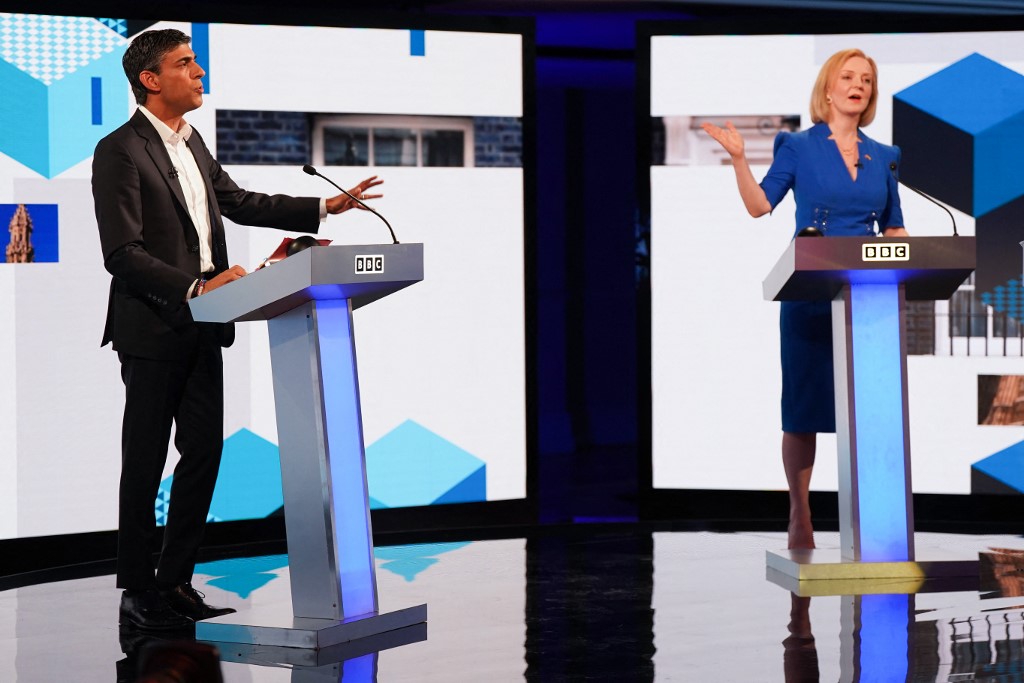As UK Prime Minister Boris Johnson set the scene in spectacular fashion. All who sought to confine him to history, perished. He was the only one who seemed to survive, and reject, one diabolical scandal after the next – till now.
No leader with such a destructive sense of presence could do anything but impair those who followed him. But that impairment lingers in the contenders who are seeking to replace him, and it shows.
In a system that is admirably daft, the governing party, namely the Conservatives, have given themselves a remarkable span of time to pick Johnson’s successor. A number of candidates initially put their name forth, a chaff-wheat separation exercise that eventually led to the selection of chaff.
Foreign Secretary Liz Truss rallies the Tories within the party ranks (a YouGov poll puts Truss at 62 per cent over her rival contender, Rishi Sunak, at 38 per cent). Sunak seems more appealing to the wider conservative vote. Both are unappealing in several ways and have already shown that they are not beneath populism and demagoguery in convincing the party faithful.
Like most Tories hoping to court gullible voters in the centre, we are facing an elaborate deception of privilege burnished as hard work and triumph in adversity. This is the season for counterfeiters.
Sunak is proving something of an adept in this, diminishing his privileged background in order to polish and flash invisible, underprivileged credentials. Truss supporter, culture secretary Nadine Dorries, will have none of it, noting that Truss will campaign around the country in £4.50 earrings, but Sunak will do so in a £3,500 bespoke suit, along with £450 Prada loafers.
Truss is also playing on false images, though prefers to lie in more confident fashion. With mendacious thrill, she claims to have grown up in a “red wall” seat, as if it might have proved anything. “I got where I am today through working hard and focusing on results.” If it is that mindless, corrosive activity of Instagramming, then she might have a point. If an event is not posted on social media, it never took place.
In terms of policy, if we dare go there, Truss is a conventional supply sider, wanting to cut taxes despite obstinately rising inflation. She argues that the budget has enough fiscal headroom to the tune of £30 billion, an amount that will be dramatically cheapened with inflation. She also boasts of delivering a number of trade agreements, though many were simply copied, roll-over versions of deals made when the UK was an EU member.
Sunak, former Chancellor of the Exchequer, does not see taxes as satanic, and is considering raising them as a dampening measure to cope with rising prices. Should he become Prime Minister, the corporation tax rate will rise from 19 per cent to 25 per cent in 2023.
Sunak, in some respects, is going for a softer touch, such as improving home insulation to cut energy bills. Unfortunately, the Energy Savings Trust has found that loft insulation, while saving a terraced home £230 a year on energy bills, would also cost £500 to install. Even as Chancellor, his efforts to encourage homes to install insulation via the green homes grant scheme failed to gain momentum, resulting in its scrapping.
On foreign policy, however, Sunak claims to be the hardest of hard men. Having been called by Chinese state outlet Global Times “clear and pragmatic” in the face of Sinophobia, he was bound to insist on a measure of difference. To that end, the closure of the Confucius Institutes in Britain – namely, all 30 of them – is promised. In doing so, he hopes to strangle Chinese “soft power” while rooting out Beijing’s industrial espionage efforts.
With militant fervour, he also promises to “kick the CCP out of our universities”, the sort of meaningless babble that risks harming academic endeavours. The method of doing so will involve mandating higher education establishments to disclose the nature of their foreign funding associations for amounts above £50,000, including the review of research partnerships. All such proposals always tend to harm the host institution more than the foreign target.
This was of little concern to Sunak, who has suddenly discovered an interest in human rights. “They torture, detain and indoctrinate their own people, including in Xinjian and Hong Kong, in contravention of their human rights. And they have continually rigged the global economy in their favour by suppressing their currency.”
Sunak’s language on rights is rich given his own attitude to those wishing to find sanctuary in Britain. His ideas on irregular migration have ranged from housing arrivals in cruise ships in a hark back to the bad old days of British penology to enthusiastically supporting, along with Truss, the transfer of irregular migrants to Rwanda, a country not exactly famed for its human rights record. This, from a grandson of immigrants from Punjab who ended up in East Africa before making their way to Britain.
A deliciously appropriate note on the campaign so far was struck in this week’s The Sun and TalkTV debate, hosted by journalist Kate McCann. Both Truss and Sunak fronted up. Harry Cole, political editor of The Sun, intended to co-host, but contracted Covid. McCann, left in charge, made her solid contribution to the whole affair by fainting. “We apologise to our viewers and listeners,” the channel stated with regret, sparing the audience the inanity of it all by calling the whole thing off. Johnson must have relished it all.
In the slime-touched final runoff between two bottom-of-the-barrel finds, voters meet two candidates who, in finding wealth or coming from it, seek the ultimate prize of a country that once kept a quarter of the globe in described, cricket-enlightened subjecthood. The prize is barely worth it, and, with Britain no longer part of the EU, barely noticeable.
